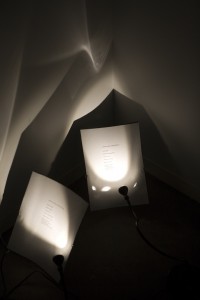John Cayley: Writing To Be Found—Three Screen-Based Projects, with a reading by Joanna Howard, November 15, 2013, and on display through December 8, 2013
 John Cayley: Writing to be Found—Three Screen-Based Projects
John Cayley: Writing to be Found—Three Screen-Based Projects
Opening Night Performance by John Cayley and Reading by Joanna Howard
On November 15 at 7 p.m. Counterpath hosted an opening for an exhibition of John Cayley’s recent work—an installation exploring ambient poetics in programmable media and aestheticized vectors of contemporary reading. Opening night featured a performance by Cayley and a reading by writer Joanna Howard. The installation is on display through December 8.
Joanna Howard reading at the opening for the John Cayley exhibit.
From “The Readers Project” and “How It Is in Common Tongues”
(Networked algorithmic readers, mixed media, custom software, 2009–2012)
The screen displays an algorithmic reader moving through a section of Samuel Beckett’s How It Is that was known and published earlier as ‘The Image.’ This reader highlights, successively, the longest sequence of words from “The Image” that it has found to have been composed by at least one other writer or writing machine—not Beckett—and is citable as such on the Internet. On a local network, the system broadcasts its readings. Visitors with wifi connectivity may join this network and read another text collaged, quasi-algorithmically, from particular instances of language within which the Beckett phrases are embedded and shared.
“Orthographics”
(mixed media, custom software, 2012)
Paired words are displayed on a monitor. More or less imperceptibly, the words change. From time to time, an entirely different word or word pair will be displayed. Derivation of the word pairs is computationally assisted and changes are triggered by a quasi-random process, though the collections for possible pairings are authored. The piece is a minimalist engagement with experiences of reading, playing at the limits of orthography and with how we understand this aspect of writing.
“Monoclonal Microphone”
(generated poetic texts, mixed media, custom software, 2011)
An animated visual exploration of 1020+1 generated poems from the intrinsically open-ended sequence “Monoclonal Microphone.” The display zooms out to show the entire field of poems and then repeatedly zooms in to focus on a single poem selected at random such that it can be read by a human viewer. All the poems are composed from adjective-noun phrases that were not found with any occurrences, using Google web search, at the time when this field of poems was made. All the poems share a notional/potential “grammar” or syntactic arc (also determined by algorithmic search) and patterns of word choice correlated with “stanza” breaks.
JOHN CAYLEY is a pioneering practitioner and theorist of digital language arts. He makes his work chiefly in the domain of poetry and poetics. Recent and ongoing projects include How It Is in Common Tongues, a part of the The Readers Project with Daniel C. Howe (thereadersproject.org), imposition with Giles Perring, riverIsland, and what we will … Information on these and other works may be consulted at
 Joanna Howard is the author of On the Winding Stair (Boa editions, 2009) and In the Colorless Round, a chapbook with artwork by Rikki Ducornet (Noemi Press). Her work has appeared in Conjunctions, Chicago Review, Verse, Unsaid, Quarterly West, American Letters & Commentary, Fourteen Hills, Western Humanities Review, Salt Hill, Tarpaulin Sky and elsewhere. Her stories have been anthologized in PP/FF: An Anthology, Writing Online, and New Standards: The First Decade of Fiction at Fourteen Hills. She has also co-translated, with Brian Evenson, Walls by Marcel Cohen (Black Square, 2009) and co-translated with Nick Bredie Cows by Frédéric Boyer (forthcoming from Noemi Press). She lives in Providence and teaches at Brown University.
Joanna Howard is the author of On the Winding Stair (Boa editions, 2009) and In the Colorless Round, a chapbook with artwork by Rikki Ducornet (Noemi Press). Her work has appeared in Conjunctions, Chicago Review, Verse, Unsaid, Quarterly West, American Letters & Commentary, Fourteen Hills, Western Humanities Review, Salt Hill, Tarpaulin Sky and elsewhere. Her stories have been anthologized in PP/FF: An Anthology, Writing Online, and New Standards: The First Decade of Fiction at Fourteen Hills. She has also co-translated, with Brian Evenson, Walls by Marcel Cohen (Black Square, 2009) and co-translated with Nick Bredie Cows by Frédéric Boyer (forthcoming from Noemi Press). She lives in Providence and teaches at Brown University.
